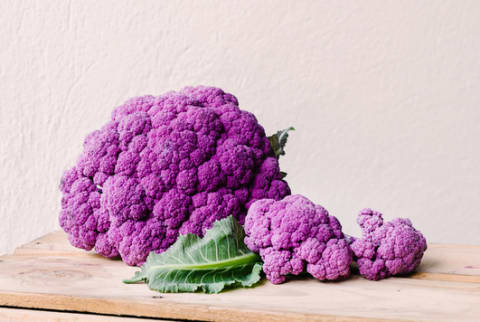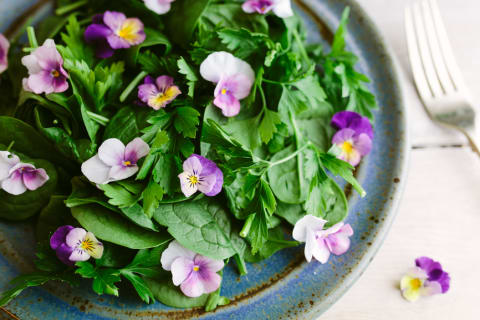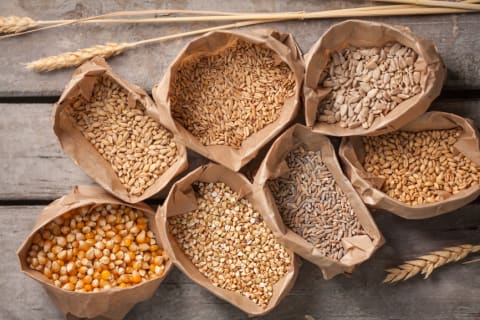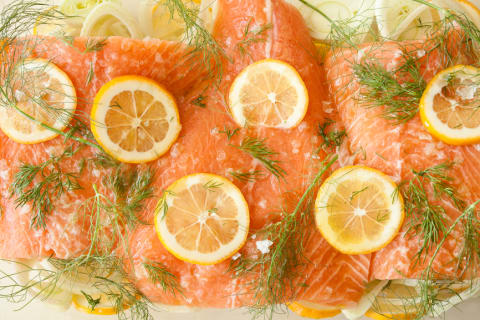Advertisement

During times of stress, some of us have a tendency to turn to food for comfort1. Unfortunately, that comfort is fleeting and we end up feeling guilty, not to mention overeating can lead to mood swings, blood sugar imbalances1, weight gain, and more stress than we had to begin with! It doesn't have to be that way. By incorporating these four stress-busting foods into your meals, you can banish stress and take on whatever comes your way.
1. Cauliflower
I love cauliflower because it's a rich source of vitamin C. While we typically think of vitamin C as an immune-booster (which is true), it's also an incredibly important nutrient for stress.
Our adrenal glands, which are nestled atop our kidneys, are in charge of our stress hormones like cortisol and adrenaline, plus they produce our sex hormones and chemical messengers that regulate blood pressure. Vitamin C is stored in high concentrations in the adrenal glands2, and when we're feeling stressed, we burn through that vitamin C like nobody's business.
Here's where cauliflower comes in—it can help you replace that lost vitamin C so your adrenal glands will continue to function optimally. (Other wonderful vitamin C foods are bell peppers, broccoli, Brussels sprouts, papaya, strawberries, and oranges.)
And, as a sweet bonus, cauliflower is a cruciferous vegetable. It's high in glucosinolates—plant compounds that have anti-cancer, anti-inflammatory, and detoxifying properties.
How to Use It: Cauliflower is an amazing substitute for mashed potatoes. Simply steam and mash it as you would potatoes and serve it as a side dish or as a topping for shepherd's pie. Cauliflower is wonderful when roasted with your favorite herbs and spices, or you can transform it to make cauliflower rice.

2. Spinach
Dark leafy greens contain a wide variety of health-supportive nutrients, but I like to have them on hand during stressful times because it's high in magnesium—our body's relaxant mineral.
That means eating magnesium-rich foods such as spinach can help us relax and de-stress. It's an important mineral for our adrenal glands as well, and when we're stressed we can lose larger amounts3 of magnesium, leading to additional stress and achy muscles.
Spinach contains several other nutrients that are essential for keeping us calm like vitamin C and B vitamins, which are important for healthy nerve and brain function. It also is packed with iron to help us have the energy for those long workdays.
How to Use It: Spinach is a mild-flavored green, so it's an easy one to use in green smoothies, salads, and dips. I like to toss a few handfuls into cooked dishes like soups, stir-fries, and stews, or scatter it atop pizza. Don't overcook your spinach, as it will lose its nutrient value—add it into hot dishes at the end of cooking. The heat of the dish will allow your spinach to wilt until it is bright green and tender.

3. Buckwheat
In general, gluten-free grains are high in B vitamins, which as I mentioned are important for fighting stress because they support our nervous system.
I favor buckwheat in particular because it's extremely high in minerals like magnesium and manganese, which is a mineral that is a cofactor in many enzymes, including antioxidants that protect us from the damage caused by stress.
Buckwheat is high in amino acids, the building blocks our bodies use to make protein. Protein is important for healing, repair, and for supporting the production of neurotransmitters in the brain4. Plus, buckwheat supports the digestive tract, helps lower blood sugar, and reduces the risk of cardiovascular disease.
How to Use It: Raw buckwheat has a neutral flavor, while toasted buckwheat (also called kasha) has a stronger, nuttier flavor. Cook up a batch and use it like you would any other grain—incorporate it into pilafs or stuffed peppers; serve it with soups, stews, or stir-fries; stir it into risotto' or even blend it into smoothies. Buckwheat flour is also a good one to experiment with in gluten-free baking.

4. Salmon
Salmon is a well-rounded stress-fighting food. It's high in omega-3 fatty acids, which help to fight the inflammation caused by stress. One particular omega-3, called DHA, is especially important for supporting the brain5.
Another brain-booster in salmon is vitamin B12, a vitamin that supports the nervous system6 and has been studied for its effects on depression, mood, and even dementia, plus salmon is a fantastic source of protein, which we already know is crucial to neurotransmitter production.
Finally, salmon contains choline, a nutrient used to make acetylcholine7—a neurotransmitter that is essential for proper nervous system function and cognition. When our nervous system is operating in good order, we'll feel less stressed overall!
How to Use It: Bake, pan-fry, or steam salmon in your go-to marinade and serve it with a side of greens or roasted veggies. Flake any leftovers over a salad the next day, or mash it into a salmon salad for serving with crackers or toast. If you can't stand the smell of salmon, you might be overcooking it!
These stress-fighting foods are simple to prepare and easy to find at most major grocery stores. Add them to your shopping list and you just might find yourself feeling much calmer!
7 Sources
- https://www.ncbi.nlm.nih.gov/pmc/articles/PMC4214609/
- https://www.ncbi.nlm.nih.gov/pubmed/15666839
- https://www.ncbi.nlm.nih.gov/pubmed/26591563
- https://www.ncbi.nlm.nih.gov/pubmed/19454292
- https://www.ncbi.nlm.nih.gov/pmc/articles/PMC4404917/
- https://www.ncbi.nlm.nih.gov/pubmed/17052662
- https://www.ncbi.nlm.nih.gov/books/NBK11143/
